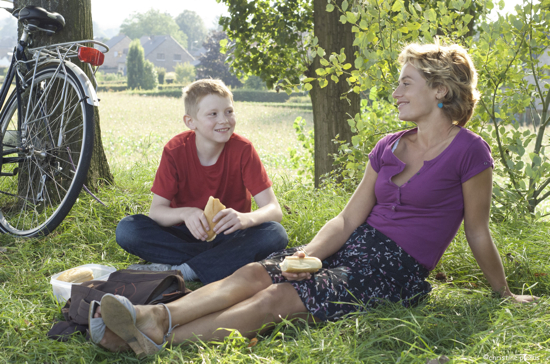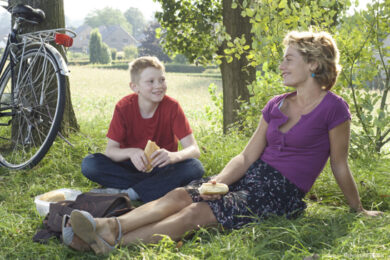Belgian brothers Jean-Pierre and Luc Dardenne are among the best filmmakers working in Europe today – possibly in the world. For the last 30 years, they’ve written, produced and directed intense dramas including 1996’s La Promesse, the film that first brought them international acclaim, as well as Rosetta (1999), Le fils (2002), L’enfant (2005) and Le Silence de Lorna (2008). Their pictures have a reputation for being hard-hitting, depicting the harsh realities of ordinary people’s lives in modern Belgium; they are about how people are crushed by life, by poverty, fear, crime, deprivation and loss, and what some people have to do to survive.
But as their latest, The Kid With A Bike (Le gamin au vélo) demonstrates, ‘social realism’ isn’t an adequate description of what the Dardennes do. Their dramas transcend grim settings, structuring narratives around extraordinary responses to tragic situations. They’re suffused with a hope that verges on the fantastical, and The Kid With A Bike exemplifies this particular brand of tension.
Many successful films have a similar thematic scope. It’s reminiscent particularly of the language of much of the Iranian New Wave, for example Jafar Panahi’s The White Balloon (1995) and Crimson Gold (2003), or Mohsen Makhmalbaf’s Gabbeh (1996). Closer to home, their work bears comparison with Laurent Cantet’s marvellous, heartbreaking dramas, or Ken Loach’s best work.
The titular hero is Cyril Catoul (the wonderful Thomas Doret): an 11-year-old boy who’s recently been washed up in a state-run children’s home after his father Guy (Jérémie Renier) abandoned him. Cyril is a bundle of energy, anxiety and aggression. He’s ‘the kid with a bike’ because he’s permanently attached to it, always on the move, whether cycling furiously to get somewhere or messing around aimlessly. When deprived of his bicycle, he’s chasing the kids who sporadically steal it from him; indoors, he bursts through doors, rockets in and out of rooms. His first instinct is always to run. The film tells the story of how Cyril might finally get to a place he doesn’t need to run from.
Despite his abandonment, Cyril finds it impossible to accept that he’s not wanted. He continues the search for his dad, and he asks the local hairdresser Samantha (Cécile de France) if she’ll foster him at weekends. If Cyril’s plight is the realist face of the coin, Samantha is the other: the fantasy of the extraordinary, the dream-come-true. Samantha seems to be a paragon of incredible virtue, foster parent willing not only to help, feed and clothe him, but also to love him unconditionally.
But her unrealistic goodness has to be tested, and things don’t run smoothly. It’s when he’s staying with Samantha that Cyril, venturing out after his bike is stolen again, falls under the spell of the local drug dealer Wes (Egon Di Mateo). Why does Cyril trust a boy he hardly knows over the woman who opened her home to him? Is she colder than we think? It’s not that. It’s the understanding that peer pressure is always going to trump parental influence, especially for someone like Cyril who’s been so comprehensively let down by his real parents. It’s this kind of emotional truth and conflict that balances the entirely selfless character of Samantha; this is the reason the film isn’t superficially ‘realist’, but is emotionally realistic and utterly believable.
Films about troubled children often explore their difficulties to illuminate adult problems – to highlight conflicts that the latter aren’t able to express – but the adults in Cyril’s world are uncomplicated, good or indifferent. It’s the children and teenagers that are complicated and rounded. The Dardennes have a talent for focusing on the child’s eye view, the exploration of the way that children get to know the the places they live in, in ways that adults tend not to notice. They know about the abandoned shacks, the little undefined places off anonymous roads where they go to play. And they know children’s emotions, how they’re magnified, how kids can’t hide what they feel in the way adults can, and how it’s easy to imagine that they feel more deeply, because everything is new in their experience.
With The Kid With A Bike, this tension between urban fantasy and kitchen sink realism is stronger perhaps than in previous films. The fantasies of a happy life for Cyril and true selflessness on Samantha’s part don’t feel wrong even in the context of deprivation, foster care and parental abandonment. What the Dardenne brothers’ films give us is a dreamlike sense of a correct order to human relationships, an order that seems to come from a belief in essential human goodness that verges on the fantastical. This is despite the fact that terrible, sad, unfair things often happen, even to good people. The way they balance this tension is peculiar to them, and it makes for compelling and wonderful films.



